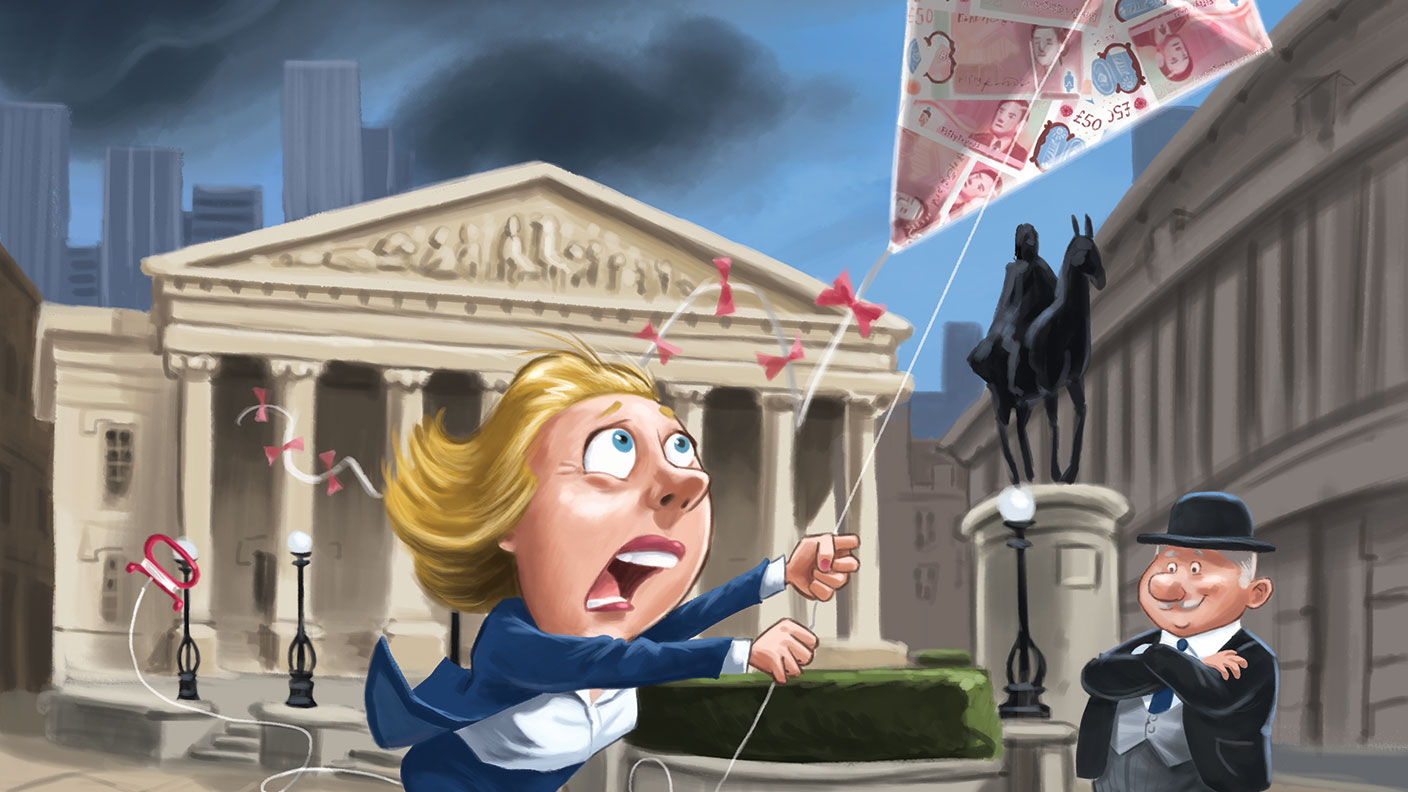A hard rain’s not gonna fall after Brexit
John Stepek looks at how Brexit might unfold from here – and how it could affect your investments.

Get the latest financial news, insights and expert analysis from our award-winning MoneyWeek team, to help you understand what really matters when it comes to your finances.
You are now subscribed
Your newsletter sign-up was successful
Want to add more newsletters?

Twice daily
MoneyWeek
Get the latest financial news, insights and expert analysis from our award-winning MoneyWeek team, to help you understand what really matters when it comes to your finances.

Four times a week
Look After My Bills
Sign up to our free money-saving newsletter, filled with the latest news and expert advice to help you find the best tips and deals for managing your bills. Start saving today!

Here at MoneyWeek, we were openly pro-Brexit during the referendum campaign. Our main reason for backing Leave was to guard against the UK being dragged into any further EU integration plans. That may seem unlikely today, but barely ten years ago joining the euro was still a live political issue for Britain.
In the absence of Brexit it could become one again in the future. Beyond that, on trade, we'd like free trade with the EU and everyone else too. As for immigration, we think it would be sensible to have an open and honest discussion about the social and economic impacts of free movement, and how to offset those impacts, rather than sweep those questions under the carpet for ideological reasons.
It seems that most British voters agree with us. A post-Brexit survey of UK voters by social research institute NatCen found "nearly universal support for maintaining free trade between the UK and the EU", says John Curtice, professor of politics at the University of Strathclyde. Equally, notes BuzzFeed, while "a majority of Leave voters backed free trade, financial passporting and following EU manufacturing regulations a majority of Remain voters supported limiting immigration and introducing customs".
MoneyWeek
Subscribe to MoneyWeek today and get your first six magazine issues absolutely FREE

Sign up to Money Morning
Don't miss the latest investment and personal finances news, market analysis, plus money-saving tips with our free twice-daily newsletter
Don't miss the latest investment and personal finances news, market analysis, plus money-saving tips with our free twice-daily newsletter
In other words, it shouldn't be hard for the government to find a Brexit route that will be acceptable to all but the most ardent Leavers and Remainers: free trade with Europe and others, accompanied by a more flexible border control policy. All that needs to be haggled over is the price.
As Matthew notes on page 26, European voters don't want to see Britain get both free trade and an opt out from freedom of movement. And that's entirely understandable why should Britain get all the upside of Brexit and none of the downside? However, Europe also has a highly eventful political calendar coming up in 2017. How might that affect the Brexit talks?
The precise treatment of the UK on terms of trade is unlikely to be a big electoral issue in other countries. However, immigration is another matter. According to YouGov, voters in Italy, France, Germany and Spain the four biggest EU economies are all more concerned about the impact of immigration than the British are.
If politicians in those nations want to forestall the rise of populist parties in their own backyard, they'll be encouraging the EU to be more flexible in its approach to freedom of movement. In other words, 2017 may see the EU as a whole move closer to the UK in its stance on migration.
That leaves the European Commission itself. While Jean-Claude Juncker and colleagues might want to make an example of Britain, this is a presentational issue more than anything else. They can portray any deal as demoting Britain to a second-class member of "greater Europe" with paid-for access privileges; the government can say that it has met the demands of the British people without being overly disruptive.
It's the path of least resistance and if there's one thing we know about politicians, that's often their preferred option. So the bespoke option outlined by Matthew on page 26 need not be as hard to achieve as the pre-match fighting talk might make out.
Of course, the EU may well feel that it has no need to do a deal, and that the Article 50 process gives it an unassailable advantage. After all, if Europe doesn't like the deal on offer from Britain, then all it has to do is stall until we end up with hard Brexit by default. That would damage the EU too (it would miss Britain's budget contributions, for a start), but it's certainly a possible outcome.
Which is why Theresa May must be prepared to do what any good negotiator does in a no-win situation, and walk away. Perhaps the only way for the UK to get what it wants is to opt for a hard Brexit, and then negotiate from there. If that's the case, then so be it. I look at the investment implications below.
The sectors to watch
On balance, we'd expect some sort of compromise on Brexit, rather than a "hard" exit, or none at all. But it might take time. Assuming that Article50 is indeed invoked in March, it could be up to two years before we getany sort of Brexit at all. As far as the pound goes, expect it to rise whenhopes of a "softer" Brexit are in the air, and to fall when a "hard" Brexitlooks more likely. Brexit fears will also make the Bank of England wary ofraising interest rates, regardless of what happens in the US.
Beyond the fluctuating pound (and 2017 is unlikely to be as volatile as2016, given the slide we've already had), the impact on UK stocks will bemuted overall, and focused on specific industries as the full implicationsfor individual companies only become clear over time. So keep aneye on sectors that should benefit from sterling weakness (such asmanufacturing), and also on those well placed to gain from higher fiscalspending (such as construction groups). Chancellor Philip Hammond maywell loosen the purse strings in the spring budget, particularly if a hardBrexit looks as though it may be on the cards.
Get the latest financial news, insights and expert analysis from our award-winning MoneyWeek team, to help you understand what really matters when it comes to your finances.

-
 Can mining stocks deliver golden gains?
Can mining stocks deliver golden gains?With gold and silver prices having outperformed the stock markets last year, mining stocks can be an effective, if volatile, means of gaining exposure
-
 8 ways the ‘sandwich generation’ can protect wealth
8 ways the ‘sandwich generation’ can protect wealthPeople squeezed between caring for ageing parents and adult children or younger grandchildren – known as the ‘sandwich generation’ – are at risk of neglecting their own financial planning. Here’s how to protect yourself and your loved ones’ wealth.
-
 Governments will sink in a world drowning in debt
Governments will sink in a world drowning in debtCover Story Rising interest rates and soaring inflation will leave many governments with unsustainable debts. Get set for a wave of sovereign defaults, says Jonathan Compton.
-
 Why Australia’s luck is set to run out
Why Australia’s luck is set to run outCover Story A low-quality election campaign in Australia has produced a government with no clear strategy. That’s bad news in an increasingly difficult geopolitical environment, says Philip Pilkington
-
 Why new technology is the future of the construction industry
Why new technology is the future of the construction industryCover Story The construction industry faces many challenges. New technologies from augmented reality and digitisation to exoskeletons and robotics can help solve them. Matthew Partridge reports.
-
 UBI which was once unthinkable is being rolled out around the world. What's going on?
UBI which was once unthinkable is being rolled out around the world. What's going on?Cover Story Universal basic income, the idea that everyone should be paid a liveable income by the state, no strings attached, was once for the birds. Now it seems it’s on the brink of being rolled out, says Stuart Watkins.
-
 Inflation is here to stay: it’s time to protect your portfolio
Inflation is here to stay: it’s time to protect your portfolioCover Story Unlike in 2008, widespread money printing and government spending are pushing up prices. Central banks can’t raise interest rates because the world can’t afford it, says John Stepek. Here’s what happens next
-
 Will Biden’s stimulus package fuel global inflation – and how can you protect your wealth?
Will Biden’s stimulus package fuel global inflation – and how can you protect your wealth?Cover Story Joe Biden’s latest stimulus package threatens to fuel inflation around the globe. What should investors do?
-
 What the race for the White House means for your money
What the race for the White House means for your moneyCover Story American voters are about to decide whether Donald Trump or Joe Biden will take the oath of office on 20 January. Matthew Partridge explains how various election scenarios could affect your portfolio.
-
 What’s worse: monopoly power or government intervention?
What’s worse: monopoly power or government intervention?Cover Story Politicians of all stripes increasingly agree with Karl Marx on one point – that monopolies are an inevitable consequence of free-market capitalism, and must be broken up. Are they right? Stuart Watkins isn’t so sure.